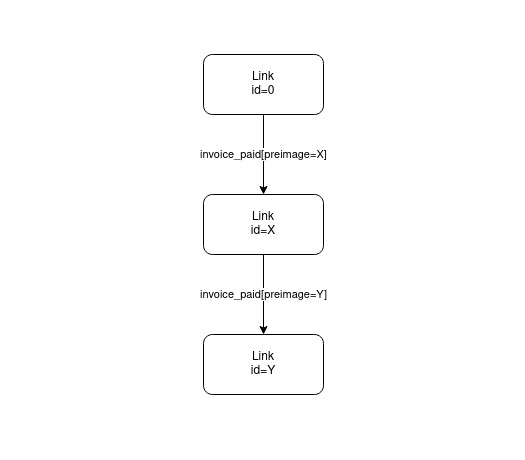Creating the Link Class
For our application, we can think of the leaders in the game as links in a chain. There is always a link at the end that is "open" for taking over the leadership position. The last closed link in the chain is the current leader of the game.
The Link class defines a single link in the chain of ownership. A Link can be in one of two states: unsettled or settled.
When a Link is unsettled, it means that no one has taken ownership or closed that link. It is still open to the world and anyone can pay an invoice and take ownership. Only the last link in the chain will ever be unsettled.
When a Link is settled, it means there was an invoice that was paid to close that link. The person that paid the invoice becomes the owner of that link. The last closed link in the chain is considered the current leader of the game.
Take a look at the diagram of game links again.

The preimage of a settled invoice of the prior link becomes the identifier of the next link.
Let's take a look at the Link type.
export class Link {
public invoice: Invoice;
constructor(
public linkId: string,
public localSignature: string,
public minSats: number
) {}
// Methods
}
This type has a few properties:
linkIdis the identifier of the link and will either be a seed value for the first link or the preimage of the the settling invoice of the previous link.localSignatureis our Lightning Network node's signature of thelinkId. We'll use this to construct invoices using ourcreatePreimagehelper functionminSatsis the minimum satoshis payment we're willing to accept payment to settle thisLink. This value will be larger than the last link.
You'll also notice that there is an invoice property. This property will be assigned when someone pays the Invoice that corresponds to this link.
Exercise: Implement isSettled
A Link is only considered settled when it has an invoice assigned and that invoice is settled.
Go ahead and implement the isSettled getter in server/src/domain/Link.ts which should check the invoice property to see if it has a value. If it does have a value it should check the invoice to see if it has been settled.
public get isSettled(): boolean {
// Exercise
}
When you are finished you can verify you successfully implemented the method with the following command:
npm run test:server -- --grep isSettled
Exercise: Implement nextLinkId
Once a Link is settled, the nextLinkId property should contain the settling invoice's preimage.
This property should only return a value when a Link is settled. When the Link is settled it should return the invoice's preimage.
Go ahead and implement the nextLinkId getter.
Dev Tip: You can return undefined when you don't want the function to return a value.
public get nextLinkId(): string {
// Exercise
}
When you are finished you can verify you successfully implemented the method with the following command:
npm run test:server -- --grep nextLinkId